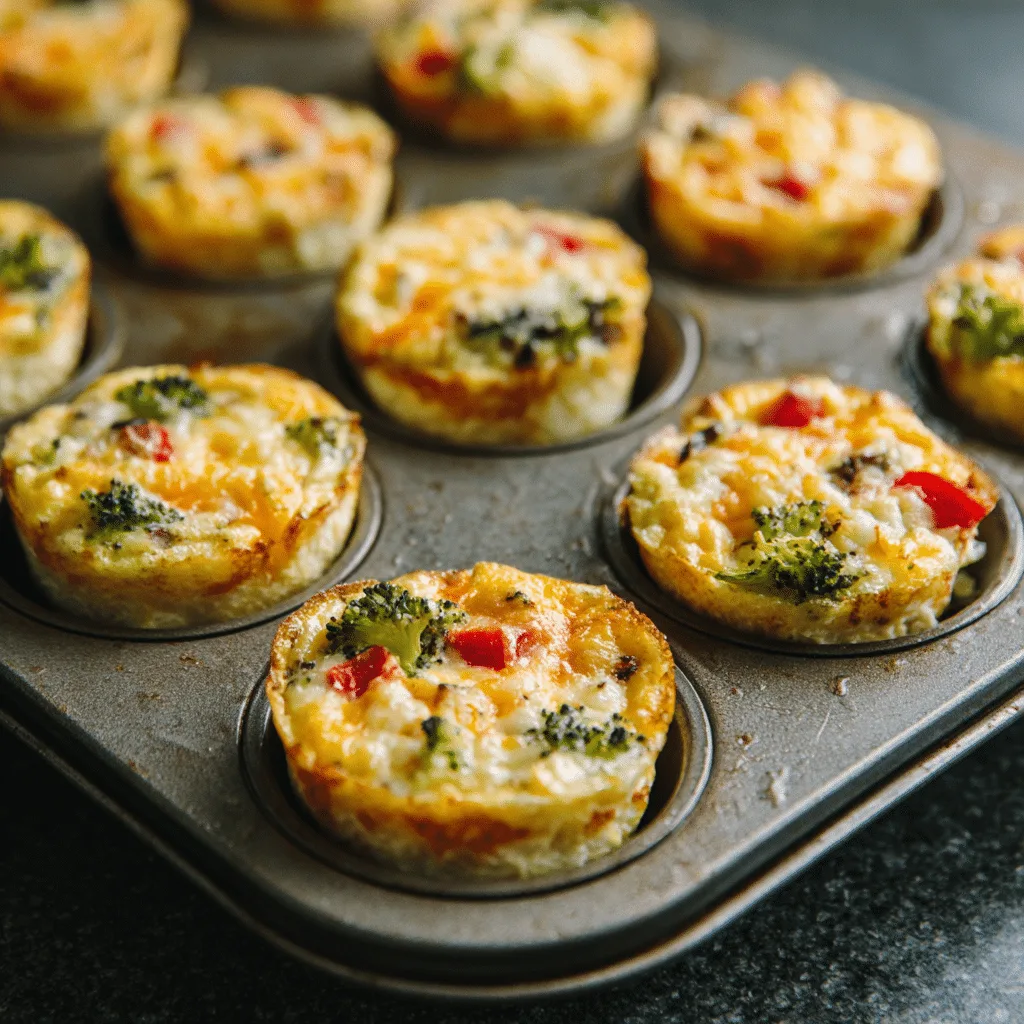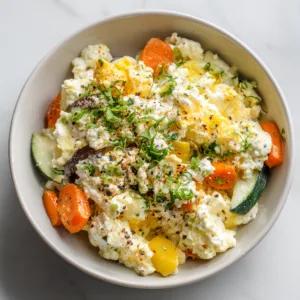Breakfast egg muffins have saved my mornings more times than I can count. They’re quick to prep, endlessly customizable, and packed with the protein I need to feel full and energized. Whether I’m rushing out the door or sitting down with a cup of coffee, these little egg cups check all the boxes: easy, tasty, and totally meal prep–friendly.
Plus, they freeze beautifully—so making a big batch means breakfast is ready all week long. If you’ve been exploring ways to simplify your mornings with high-protein options, these are a must. I also include them in my regular high protein meal prep rotation because they’re just that reliable.
Let’s crack some eggs and make mornings easier.
Table of Contents
Table of Contents

Ingredients You’ll Need
The Base Ingredients for Breakfast Egg Muffins
At the heart of every great batch of breakfast egg muffins is a handful of simple, fresh ingredients. You don’t need anything fancy—just a few fridge staples and your favorite mix-ins.
Here’s what I use most often for a solid base:
- Large eggs – I usually use 10–12 eggs for one batch
- Milk or cream – Just a splash to keep things fluffy
- Shredded cheese – Cheddar, feta, or mozzarella work great
- Salt and pepper – A basic seasoning blend for every variation
Mix-and-Match Add-Ins
This is where you make it yours. Add-ins are totally flexible and can fit any lifestyle—from vegetarian to keto. Some of my favorites:
Vegetables:
- Chopped spinach
- Bell peppers
- Red onion
- Mushrooms
- Zucchini (grated or diced)
Proteins:
- Cooked bacon or sausage crumbles
- Diced ham
- Turkey or chicken breast
- Tofu (crumbled) for a vegetarian boost
Cheese options:
- Sharp cheddar
- Crumbled feta
- Goat cheese
- Dairy-free alternatives
Substitutions & Customization
For low-carb or keto versions, use heavy cream and stick to high-fat cheeses and meats. Want extra protein? Add a few egg whites or stir in a tablespoon of cottage cheese per muffin. Going dairy-free? Swap the cheese and milk for almond milk and vegan shreds.
These muffins are part of my favorite easy meals because the combos are endless, and prep takes just 10 minutes. Whether you like them spicy or mild, veggie-packed or protein-loaded, they adapt to your taste—and your pantry.
Step-by-Step Instructions
Let’s Get Baking
Once you’ve got your ingredients chopped and ready, making breakfast egg muffins couldn’t be easier. I usually prep a dozen at a time, which lasts my family 3–4 days. The best part? It all comes together in just a few simple steps.
1. Preheat your oven to 375°F (190°C).
This gives the muffins time to cook through gently without drying out.
2. Prep your muffin tin.
Lightly grease with nonstick spray or use silicone muffin liners. This step is key—trust me, no one wants to scrape stuck eggs off metal.
3. Add your mix-ins.
Divide chopped veggies, cooked meat, and cheese evenly into the cups. I fill each one about halfway before adding eggs.
4. Whisk your eggs.
Crack 10–12 eggs into a bowl, add a splash of milk (or cream), season with salt and pepper, then whisk until well combined.
5. Pour the egg mixture into each muffin cup.
Leave a bit of space at the top—they’ll puff as they bake.
6. Bake for 20–25 minutes.
Check doneness by gently pressing the center—it should be firm but not rubbery. You can also insert a toothpick—it should come out clean.
7. Let cool for 5–10 minutes.
This helps them set and makes removing them from the pan way easier.
Depending on your cooking style, you can tweak these steps easily. Prefer bold flavors? Add chili flakes or smoked paprika. Like batch cooking? Double the recipe and freeze half.
Once cooled, these breakfast egg muffins are ready for the fridge—or the freezer for longer storage.

Variations to Try
Make Breakfast Egg Muffins Your Own
One of the things I love most about breakfast egg muffins is how easy they are to customize. Whether you’re cooking for picky eaters, following a specific diet, or just using up leftovers, these egg cups adapt beautifully.
Here are some of my favorite ways to switch them up:
Vegetarian Breakfast Egg Muffins
Skip the meat and go all-in on veggies and cheese.
Try combos like spinach + mushroom + feta or bell pepper + onion + sharp cheddar. You still get plenty of flavor—and plenty of protein—especially if you add in a few extra egg whites or a spoonful of cottage cheese.
Keto or Low-Carb Egg Muffins
For a low-carb version, use full-fat dairy, bacon or sausage, and non-starchy veggies like spinach, mushrooms, or zucchini.
Avoid milk and go for heavy cream for extra richness. These are perfect if you’re meal prepping for a keto lifestyle.
High Protein Power Muffins
Want to increase protein without adding bulk? Stir in cottage cheese, Greek yogurt, or even unflavored whey protein to the egg mixture.
Another trick? Use 6 whole eggs and 6–8 egg whites in your base.
Kid-Friendly Versions
Keep it simple with just eggs, cheese, and mild veggies like corn or finely diced carrots. Use silicone muffin pans with fun shapes—trust me, that helps! Mild cheddar or mozzarella makes them approachable for little taste buds.
With just one base recipe, you can make four completely different batches of breakfast egg muffins—without extra effort. That’s what makes them a staple in my house.
Tips & Meal Prep Hacks
Make Prep Smarter, Not Harder
If you’re like me, anything that makes mornings easier is worth repeating. That’s why breakfast egg muffins have become part of my weekly routine—and over time, I’ve picked up a few smart tips to help you avoid common mistakes and make them even better.
Don’t Skip the Grease
Whether you use a muffin tin or silicone liners, make sure to grease well. Eggs love to stick, and nothing ruins a prep session faster than prying half your breakfast out of the pan. A quick spray or swipe of oil works wonders.
Let Them Cool Before Storing
This might sound small, but don’t rush to seal hot muffins in containers. Let them cool for 10 minutes to prevent condensation, which makes them soggy. Once cooled, store in airtight containers in the fridge for up to 4 days.
Yes, You Can Freeze Them
Breakfast egg muffins freeze beautifully. I wrap each one in parchment and store them in a freezer bag. They reheat in the microwave in 30–45 seconds, or in the oven at 350°F for 8–10 minutes. Perfect for grab-and-go mornings.
Double the Batch (You’ll Thank Yourself Later)
If you’re already prepping, make a double batch and freeze half. It takes no extra time and gives you options later in the week when life gets busy.
And if you’re anything like me, after a protein-packed breakfast, you’ll probably start craving a little something sweet. That’s when I turn to one of my favorite healthy desserts—because balance is everything, right?

*Nutrition & Health Benefits
Why Breakfast Egg Muffins Are More Than Just Convenient
It’s easy to love breakfast egg muffins for how simple they are to make—but they’re also a smart choice nutritionally. These little cups are packed with protein, low in carbs, and filled with nutrients from whatever veggies and proteins you mix in.
Protein That Keeps You Full
Each muffin typically contains 8–12 grams of protein, depending on your ingredients. I usually eat two in the morning with fruit or a side of avocado, which gives me 20+ grams of protein to start my day. That’s enough to help stabilize blood sugar, keep cravings in check, and prevent the mid-morning slump.
Fewer Carbs, More Energy
Compared to bagels or cereal, breakfast egg muffins are naturally low in carbs—especially when made without milk or starchy veggies. That makes them a great option for anyone following a low-carb or keto plan, or simply trying to cut back on sugar-heavy breakfasts.
Great for Weight Loss and Meal Prep
Because they’re portion-controlled and easy to log into any macro tracking app, these muffins are perfect if you’re trying to lose weight without skipping meals. They’re satisfying, high in nutrients, and totally customizable—so you never feel deprived.
Whole-Food Ingredients, Real-Life Fuel
With real eggs, fresh veggies, and lean proteins, these muffins offer a clean, whole-food start to your day. And when paired with some fresh fruit or a spoonful of cottage cheese, they can become part of a perfectly balanced breakfast.
In short, breakfast egg muffins are a small but mighty way to start your day strong—whether your goal is energy, satiety, or simply a healthy routine that sticks.
FAQ – Breakfast Egg Muffins
1. Can I freeze breakfast egg muffins?
Absolutely. Breakfast egg muffins freeze really well. Let them cool completely, then wrap each one in parchment paper and store in a freezer-safe bag. Reheat in the microwave for 30–45 seconds or in the oven at 350°F for 8–10 minutes. They taste just as fresh as day one.
2. How long do egg muffins last in the fridge?
Properly stored in an airtight container, breakfast egg muffins will stay fresh in the fridge for up to 4 days. Make sure they’re completely cooled before sealing to avoid excess moisture, which can make them soggy.
3. Can I make egg muffins with just egg whites?
Yes! You can make egg white breakfast muffins by using 100% egg whites or a blend of whole eggs and whites. They’re lower in fat and calories but still pack plenty of protein. Add a bit of cottage cheese or non-dairy milk for extra fluff.
4. What’s the best cheese to use in breakfast egg muffins?
Cheddar, mozzarella, and feta are all great choices. For creaminess, try goat cheese or a dollop of ricotta. If you’re going dairy-free, vegan cheddar or nutritional yeast can add flavor without the dairy.




